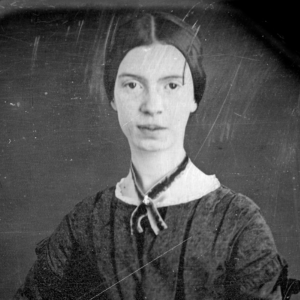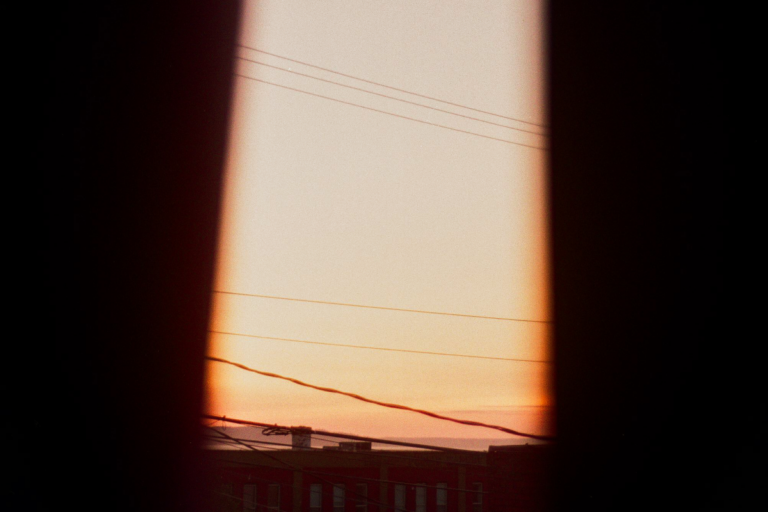Emily Dickinson
1383
Emily Dickinson’s poem “1383” honors the friendships that endure across time, circumstance, and even misunderstanding. Akin to fire, the connections in these friendships may be strong enough to burn or hurt us, but Dickinson acknowledges that their light continues to draw us in regardless.
After listening, we invite you to reflect on this question: Think about a friendship that has remained steady for you across the years, even as both of you have changed. Why do you think your relationship has endured?

© All Rights Reserved.
Guest

Emily Dickinson was a 19th-century American poet from Amherst, Mass. She wrote around 1,800 poems in her life, and her first collection of poetry was published posthumously in 1890.
Transcript
Pádraig Ó Tuama, host: My name is Pádraig Ó Tuama, and I’m an Irish poet. And poetry calls me to speak it aloud. Sometimes I’ve been on a train and I’ve been reading poetry and I’ve whispered it to myself. I somehow need to feel the air at the back of my throat, and I need to feel my vocal chords constrict in order to make the poem real.
[music: “First Grief, First Air” by Gautam Srikishan]
Number 1383 of Emily Dickinson’s poems in Johnson’s arrangements:
“Long Years apart — can make no
Breach a second cannot fill —
The absence of the Witch does not
Invalidate the spell —
The embers of a Thousand Years
Uncovered by the Hand
That fondled them when they were Fire
Will stir and understand —”
A few years ago, I had been reading some things about Emily Dickinson. And because there are no particular little books of Emily Dickinson, I decided that I’d read all 1,775 poems of hers and take a small safari through it. “A safari” is a phrase that John O’Donohue used to use when he spoke about philosophy — to take a safari through philosophy — and I thought I’d steal that, to take a safari through the work of Emily Dickinson. And in a safari, you hope to see some strange things and come out alive, and that’s what I thought I’d try to do with her.
She speaks about “the Hand / That fondled them when they were Fire,” and so you see, in that, that she’s seeing — you don’t tend to think of fondling fire. You think, perhaps, of warming your hands by fire, but not fondling it. You’re usually burnt by fire. And so, I think she understands that friendship can burn. She isn’t an idealist in the simplicity of friendship to say, oh, it’s all lovely and easy. I think she’s saying that we fondle these burning things, but yet we keep on coming back to it. And the kinds of friendship that meet across difficult encounters can be some of the ones that are the ones that last the longest — even after a thousand years.
There are some people, where, when I’ve met them, we’ve met each other and caught each other in a glance, where, almost accidentally, both of our souls felt like they were communicating through the eyes. And we’ve seen each other and thought, “Well, hello. Look at who we are now.” And that, for me, lasts decades. There’s people that I know, that I barely know, but that we have seen each other in some moment, and I’m always curious to pick up with them.
John O’Donohue has a lovely line in his book Anam Cara, where he uses the metaphor from the Book of Genesis about the human beings being made from clay. And John says that sometimes you meet somebody, and it’s as if, millions of years ago, before the silence of nature broke, his or her clay and your clay lay side-by-side. I think it’s a lovely idea, to take this metaphor that we are made from clay and that sometimes, there’s an elemental recognition when you meet somebody.
There’s one more thing to say about this that I think is really interesting, is, “The embers of a Thousand Years / Uncovered by the Hand / That fondled them when they were Fire / Will stir and understand —” It’s just that last word, “understand.” And that, to my mind, almost implies that there has been the possibility of misunderstanding or some kind of neglect or something that was un-understandable between people who love each other or who are connected. That’s what sometimes makes me think that this is a promise, rather than a reflection; that she’s thinking about the future, rather than thinking about the past.
And that’s part of the glory of Emily Dickinson, is her playing between present, past, and future. And I think of friendships that have had long periods of misunderstanding. And sometimes we know that at the beginning. There can be a great intensity in friendships, maybe in your 20s, and then people might begin to pair up, or somebody moves away; somebody doesn’t like their decision, and you think, “We’re strongly connected, but this decision has come between us.” And I love what she’s saying, is that there are certain spells, certain embers that, with time and the future, will recollect their earliest, original fire.
Number 1383 of Emily Dickinson’s poems in Johnson’s arrangements:
“Long Years apart — can make no
Breach a second cannot fill —
The absence of the Witch does not
Invalidate the spell —
The embers of a Thousand Years
Uncovered by the Hand
That fondled them when they were Fire
Will stir and understand —”
Lily Percy: “1383” comes from The Poems of Emily Dickinson, edited by Thomas H. Johnson. Thank you to Harvard University Press, who published the book and gave us permission to use Emily’s poem. Read it on our website at onbeing.org.
Poetry Unbound is Tony Liu, Chris Heagle, Kristin Lin, Erin Colasacco, Serri Graslie, Eddie Gonzalez, and me, Lily Percy. Our music is composed and provided by Gautam Srikishan. This podcast is produced by On Being Studios, which is located on Dakota land. We also produce other podcasts you might enjoy, like On Being with Krista Tippett, Becoming Wise, and This Movie Changed Me. Find those wherever you like to listen, or visit us at onbeing.org to find out more.





